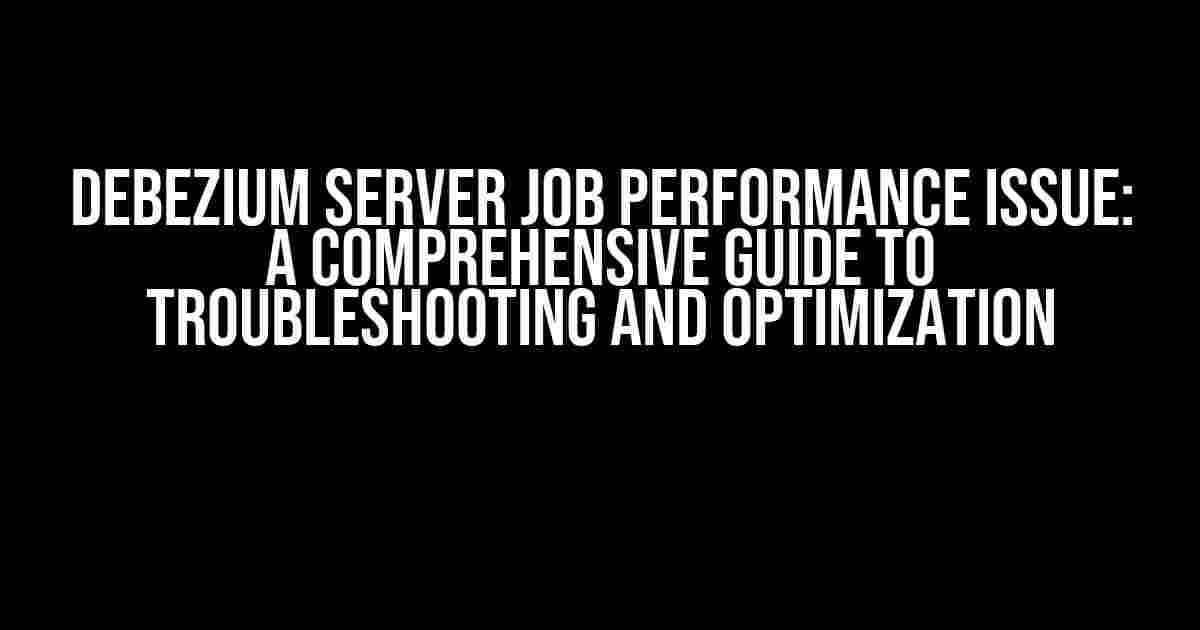Are you experiencing performance issues with your Debezium server job? Are you struggling to identify the root cause of the problem or finding it challenging to optimize your setup for better performance? You’re in the right place! In this article, we’ll take you on a journey to troubleshoot and optimize your Debezium server job performance issues, ensuring your data pipeline runs smoothly and efficiently.
Understanding Debezium Server Job Performance Issues
Before we dive into the troubleshooting process, it’s essential to understand what causes Debezium server job performance issues. Here are some common scenarios that might lead to performance problems:
- High volumes of data: Debezium is designed to handle large amounts of data, but if your data volume exceeds the server’s capacity, performance issues can arise.
- Inadequate server resources: Insufficient CPU, memory, or disk space can lead to poor performance and job failures.
- Poorly configured Debezium connector: Misconfigured connectors can cause performance bottlenecks, data inconsistencies, and even job failures.
- Network connectivity issues: Slow or unreliable network connections can hinder data transfer and cause performance issues.
- Query optimization: Inefficient queries can lead to slow data processing and performance problems.
Troubleshooting Debezium Server Job Performance Issues
Now that we’ve identified potential causes, let’s explore a step-by-step approach to troubleshoot Debezium server job performance issues:
Step 1: Check Debezium Server Logs
Debezium server logs provide valuable insights into performance issues. Look for error messages, warnings, and exceptions in the logs to identify potential bottlenecks:
grep "WARNING" /var/log/debezium.log
grep "ERROR" /var/log/debezium.log
Step 2: Monitor Server Resource Utilization
Check server resource utilization to identify potential bottlenecks:
| Resource | Command |
|---|---|
| CPU Utilization | top or htop |
| Memory Utilization | free -m or htop |
| Disk Space Utilization | df -h |
Step 3: Verify Debezium Connector Configuration
Review your Debezium connector configuration to ensure it’s properly set up:
- Verify the connector type and version.
- Check the database connection settings.
- Validate the data format and serialization settings.
Step 4: Analyze Network Connectivity
Check network connectivity between the Debezium server and the database:
ping
telnet
Step 5: Optimize Queries
Optimize your queries to reduce the load on the Debezium server:
- Use efficient data filtering and aggregation.
- Optimize query execution plans.
- Implement query caching or result set caching.
Optimizing Debezium Server Job Performance
Now that we’ve identified and addressed potential bottlenecks, let’s dive into optimization techniques to improve Debezium server job performance:
1. Scale Up or Scale Out
Scale up your Debezium server resources (CPU, memory, or disk space) or scale out by adding more servers to distribute the load:
Debezium -Xmx4096m
2. Optimize Debezium Connector Configuration
Tune your Debezium connector configuration for better performance:
connector.properties:
max.queue.size=10000
max.batch.size=1000
batch.delay.ms=100
3. Implement Query Caching
Implement query caching to reduce the load on the Debezium server:
caching.enabled=true
caching.expiration.ms=300000
4. Leverage Debezium’s Built-in Performance Features
Take advantage of Debezium’s built-in performance features, such as:
- Bulk loading
- Parallel processing
- Data filtering
Conclusion
In this comprehensive guide, we’ve covered the common causes of Debezium server job performance issues, a step-by-step approach to troubleshooting, and optimization techniques to improve performance. By following these instructions and explanations, you’ll be well-equipped to identify and resolve performance bottlenecks, ensuring your Debezium server job runs smoothly and efficiently.
Remember to regularly monitor your Debezium server job performance, adjust configurations as needed, and optimize your setup for better performance. With these best practices, you’ll be able to overcome Debezium server job performance issues and ensure your data pipeline runs like a well-oiled machine.
Additional Resources
For further information on Debezium server job performance optimization, we recommend exploring the following resources:
Here are 5 Questions and Answers about “Debezium server job performance issue” in a creative voice and tone:
Frequently Asked Question
Got a Debezium server job performance issue that’s got you stumped? Fret not, friend! We’ve got the answers to get you back on track.
What are the common causes of Debezium server job performance issues?
Debezium server job performance issues can be caused by a variety of factors, including high latency, incorrect configuration, inadequate resources, and even network connectivity problems. Other culprits might include large transaction logs, concurrent job execution, and slow database queries. Identifying the root cause is key to resolving the issue!
How do I monitor Debezium server job performance?
To keep an eye on Debezium server job performance, you can use tools like Grafana, Prometheus, or even the Debezium UI itself. These tools provide insights into job metrics, such as latency, throughput, and error rates. You can also configure logging and auditing to gather more detailed information. By monitoring job performance, you can catch issues before they become major problems!
What are some optimization techniques for improving Debezium server job performance?
Optimizing Debezium server job performance can be achieved through various techniques, including increasing concurrency, tuning batch sizes, and optimizing database queries. You can also consider deploying Debezium on more powerful hardware or leveraging parallel processing. Additionally, make sure to regularly clean up unnecessary data and maintain a healthy database to prevent performance bottlenecks!
How do I troubleshoot Debezium server job performance issues?
When troubleshooting Debezium server job performance issues, start by reviewing job logs and metrics to identify patterns or anomalies. Then, use tools like the Debezium debugger or Java Flight Recorder to gain deeper insights. Don’t forget to check your configuration files and database connections for errors or misconfigurations. By following a structured approach, you’ll be able to pinpoint the cause and resolve the issue in no time!
Can I use caching to improve Debezium server job performance?
Caching can indeed help improve Debezium server job performance by reducing the load on your database and minimizing the number of queries. Debezium supports various caching mechanisms, including in-memory caching and external caching solutions like Redis or Apache Ignite. However, be sure to carefully consider your caching strategy to avoid introducing new performance bottlenecks or data consistency issues!
I hope this helps!



